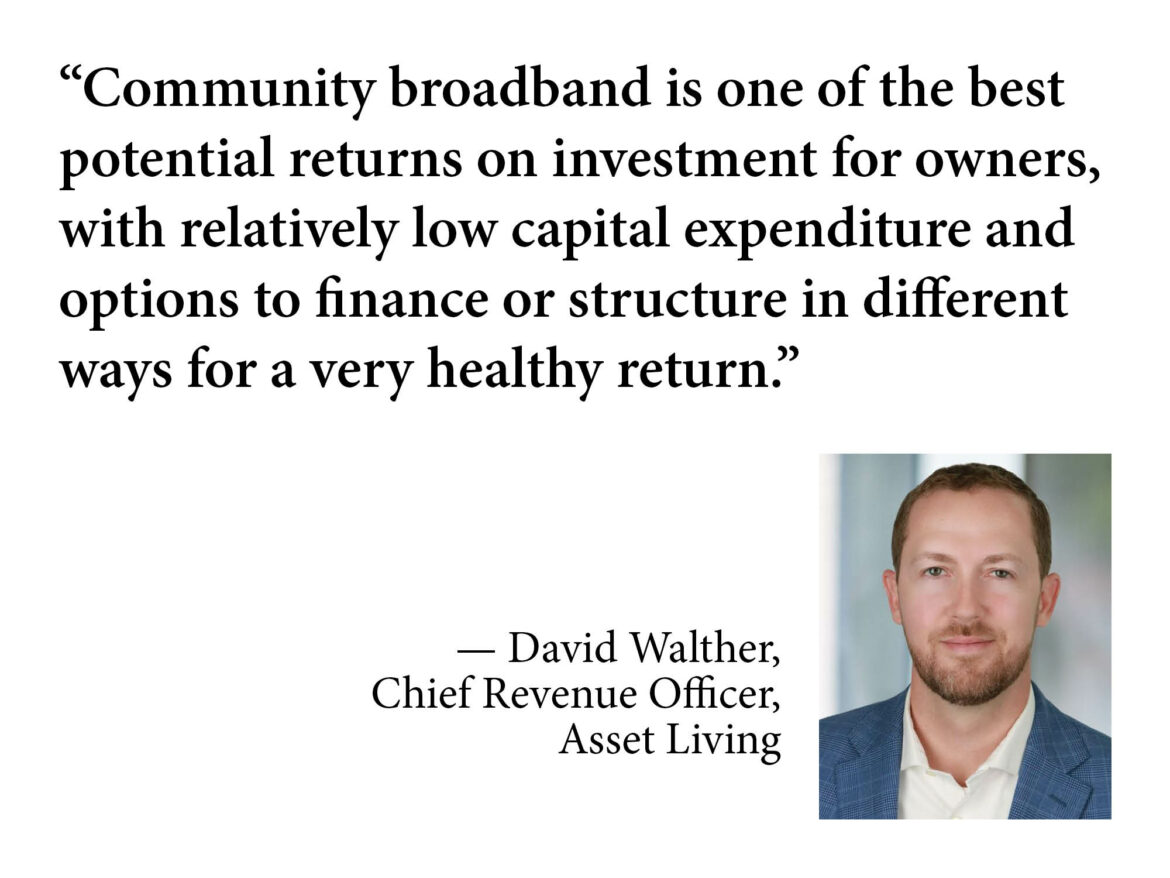Enterprising multifamily players are shifting the industry’s views on community connectivity, elevating broadband from a stand-alone amenity into a performance booster for larger real estate strategies. Rather than leave their residents’ connection quality to chance, these developers, owners and managers are contracting with specialized internet service providers (ISPs) to blanket entire properties with high-speed Wi-Fi access for the best possible online experience.
“On the operations side, rolling out community Wi-Fi lets us give residents the full connectivity they expect from other parts of their life, because all areas of the property function together for a seamless experience,” says David Walther, chief revenue officer at third-party property manager Asset Living.
Asset Living manages more than 300,000 units at client communities including conventional multifamily, student housing, affordable and other property types across the country. At nearly all student housing and a growing share of the multifamily communities Asset Living manages, matrices of Wi-Fi access points keep residents and property teams alike online as they traverse the property, from inside residential units to pools, fitness centers, garages and other common areas.
Earlier this year, Asset Living made internet service provider Pavlov Media a preferred national partner for bulk managed Wi-Fi at its communities. We asked experts at both companies why more multifamily property owners are taking a hands-on role in how residents access the internet. The biggest reason is that turnkey broadband has become more than an amenity.
“It can create an easier move-in experience when the resident shows up and their Wi-Fi is already working, so they don’t have to call a third-party provider, get a modem and schedule someone to come out and install it. It’s a huge value for residents,” Walther says.
“The other consideration for owners is the financial aspect,” he says. “Working with a broadband provider like Pavlov Media, owners can provide residents an excellent value at a much lower cost than a typical third-party internet provider would charge, and the owner can keep some of that value ancillary revenue or increased rental rates.”
Other benefits to network infrastructure include the ability to offer more competitive amenity packages featuring web-enabled appliances and other smart home technologies, Walther says. And property team members can do their jobs more efficiently when community Wi-Fi lets them update work orders, complete inspection reports and send images from mobile devices instead of trudging back to an office computer.
“Community broadband is one of the best potential returns on investment for owners, with relatively low capital expenditure and options to finance or structure in different ways for a very healthy return,” Walther says.
Landlords Take Control
In properties where residents make their own connectivity arrangements, service providers, connection quality and fees often vary from unit to unit within the same building. Overlapping signals from resident-owned Wi-Fi equipment and smart devices contribute to congestion and interference that can slow or disrupt a resident’s connection.
A property’s approval ratings (and leasing and renewals) suffer when residents experience disappointing internet speeds or inconsistent streaming, even when management teams have little influence over their residents’ connections. Opting instead for bulk managed Wi-Fi enables owners to ensure a more consistent, high-quality internet experience via network infrastructure configured to maximize speed and connectivity throughout the property.
Walther advises multifamily owners who are considering a bulk internet strategy to vet service providers on their support capabilities as well as broadband expertise. A provider should respond quickly and directly to residents’ service requests, resolving any connection issues without burdening property management teams with internet concerns.
“For third-party managers like Asset Living, one of the keys is having a full-service provider that’s going to not just implement a system but provide support the entire time it’s being used, leaving our onsite teams free to handle other duties,” Walther says. “That partner should be the first line of support when there are issues with connectivity for any reason. Anytime the system is down, they should be able to troubleshoot, get service back up and manage communications to residents.”

Pavlov Media
Bryan Rader, president of MDU at Pavlov Media, says institutional investors are driving bulk Wi-Fi adoption in the multifamily sector, incorporating network infrastructure in nearly all new projects. He estimates as much as 15 percent of apartment properties today use bulk internet infrastructure, up from about 10 percent in 2020, as the industry emerged from the COVID-19 pandemic.
“In five years, I expect bulk adoption to be 30 percent,” Rader predicts, adding that most new apartment construction incorporates Wi-Fi infrastructure, and more owners of existing communities will enter bulk arrangements as expiring ISP contracts allow. “For adoption to double in three or four years is significant. That shows how quickly the adoption of smart home technology, and bulk internet to support it, is occurring.”
Walther contends that community Wi-Fi adoption is accelerating as landlords seek ways to better compete with new construction and early adopters that are using their infrastructure advantages to boost leasing and resident retention.
“We’re in the early stages of it being adopted, but eventually community Wi-Fi will become commonplace,” Walther predicts. “Some other amenities look better on a flyer, but broadband community Wi-Fi is going to be a much more important tool for keeping residents, for getting renewals, for resident satisfaction, renewals and for maintaining and improving the property’s reputation in general.”
— By Matt Hudgins. This article was written in conjunction with Pavlov Media, a content partner of REBusinessOnline. For more information on Pavlov Media, click here.


